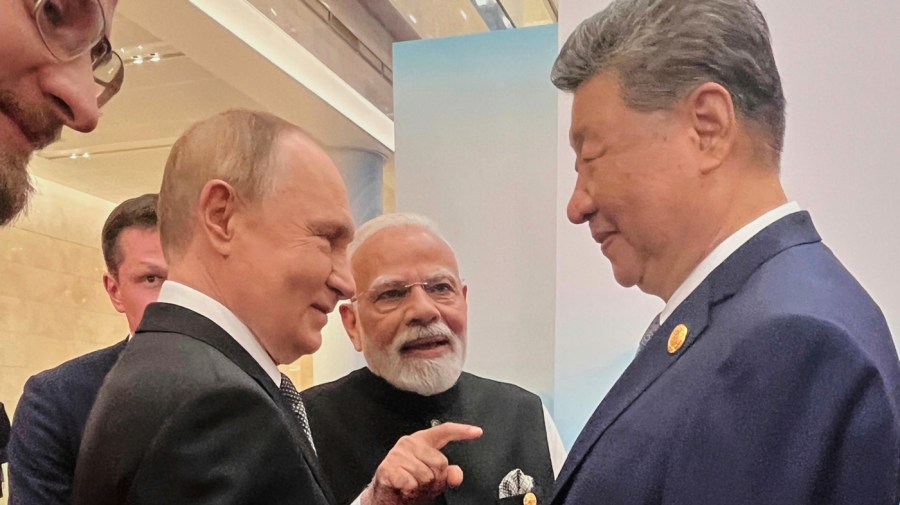World
US Must Maintain Global Leadership Amid Rising Authoritarian Threats

The United States is facing significant challenges to its global leadership as countries like China, Russia, Iran, and North Korea strengthen their ties in what is being referred to as an “alliance of autocrats.” This coalition is actively working to undermine the established U.S.-led world order, raising concerns about international stability and security.
Recent discussions among foreign policy experts emphasize the urgency of the U.S. maintaining its role as a stabilizing force in a world increasingly characterized by authoritarianism. The growing collaboration between these nations poses a direct challenge to democratic values and international norms that have been upheld since the end of the Cold War.
Impact of Authoritarian Alliances
The formation of this alliance has led to a series of actions that threaten the interests of the United States and its allies. For instance, joint military exercises conducted by China and Russia have raised alarms in NATO and among members of the G7. These exercises signal a shift in power dynamics, with authoritarian states increasingly willing to confront Western nations.
Moreover, Iran has expanded its influence in the Middle East, while North Korea continues its missile tests, defying international sanctions. These developments highlight the strategic coordination among these nations, which undermines the efforts of the United Nations and other multilateral institutions aimed at fostering global peace.
Calls for a Renewed U.S. Strategy
In response to these challenges, experts are advocating for a renewed U.S. strategy that emphasizes diplomacy, economic engagement, and military readiness. The Biden administration’s focus on strengthening alliances and partnerships is crucial in countering the growing influence of these authoritarian regimes.
Former officials have suggested that the U.S. should leverage its economic power, utilizing tools such as sanctions and trade agreements to isolate those nations that threaten global stability. Additionally, fostering closer ties with democratic allies can create a unified front against autocratic expansionism.
The need for a coherent approach is underscored by the actions of the alliance. As these nations increasingly cooperate in military, economic, and cyber domains, the U.S. must adapt its strategies to effectively respond to this evolving landscape. The implications of failing to address this situation are significant, potentially leading to a more fragmented and dangerous global environment.
Maintaining U.S. leadership is not merely a matter of national interest; it is essential to uphold the principles of democracy and human rights on a global scale. As the international community watches closely, the choices made by U.S. policymakers in the coming months will be critical in shaping the future of global governance and stability.
In conclusion, the emergence of this “alliance of autocrats” is a clarion call for the United States to reaffirm its commitment to global leadership. The stakes are high, and the time for decisive action is now.
-

 Lifestyle3 months ago
Lifestyle3 months agoLibraries Challenge Rising E-Book Costs Amid Growing Demand
-

 Sports3 months ago
Sports3 months agoTyreek Hill Responds to Tua Tagovailoa’s Comments on Team Dynamics
-

 Sports3 months ago
Sports3 months agoLiverpool Secures Agreement to Sign Young Striker Will Wright
-

 Lifestyle3 months ago
Lifestyle3 months agoSave Your Split Tomatoes: Expert Tips for Gardeners
-

 Lifestyle3 months ago
Lifestyle3 months agoPrincess Beatrice’s Daughter Athena Joins Siblings at London Parade
-

 World3 months ago
World3 months agoWinter Storms Lash New South Wales with Snow, Flood Risks
-

 Science3 months ago
Science3 months agoTrump Administration Moves to Repeal Key Climate Regulation
-

 Science2 months ago
Science2 months agoSan Francisco Hosts Unique Contest to Identify “Performative Males”
-

 Business3 months ago
Business3 months agoSoFi Technologies Shares Slip 2% Following Insider Stock Sale
-

 Science3 months ago
Science3 months agoNew Tool Reveals Link Between Horse Coat Condition and Parasites
-

 Sports3 months ago
Sports3 months agoElon Musk Sculpture Travels From Utah to Yosemite National Park
-

 Science3 months ago
Science3 months agoNew Study Confirms Humans Transported Stonehenge Bluestones









